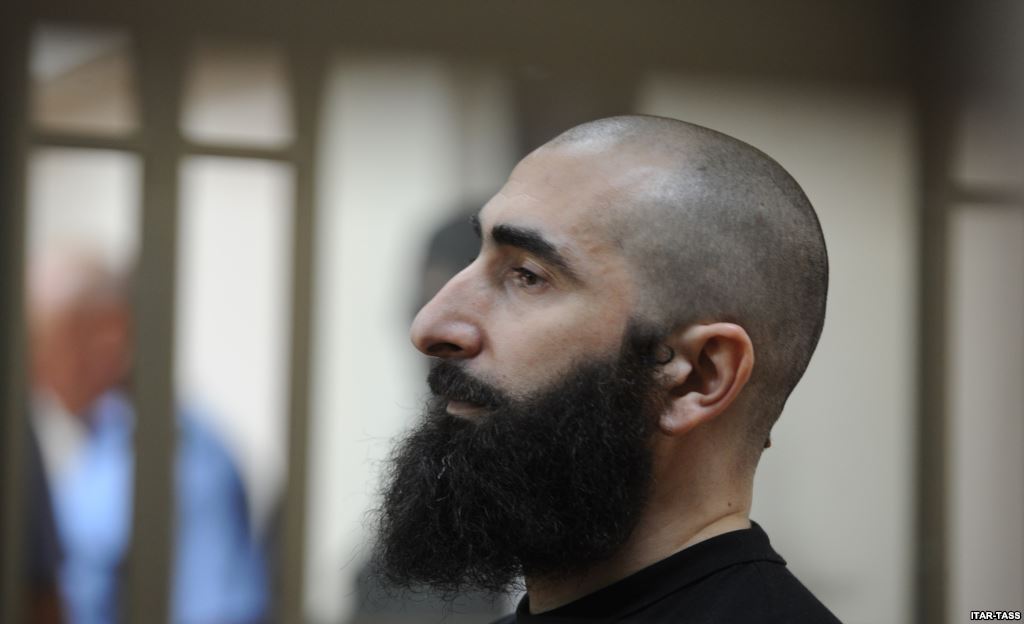
Head of Ingushetia Yevkurov Spars with Captured Insurgent Leader Emir Magas in Court
Publication: Eurasia Daily Monitor Volume: 10 Issue: 122
By:

Three years ago—on June 9, 2010—Russian authorities made a surprise announcement that one of the most significant and influential figures in the armed resistance in the North Caucasus, Emir Magas (a.k.a. Ali Taziev, Magomed Yevloev), had been captured alive and in good health (www.kp.ru/daily/24504/656718/). His capture marked a significant success by Russia’s Federal Security Service (FSB), which managed not simply to neutralize, but to capture the second most important person in the militants’ hierarchy. Emir Magas had been Shamil Basaev’s associate and assumed the position of the “military emir”—i.e., leader of the Caucasus Emirate’s military activities—after Basaev’s death (www.kavkazcenter.com/russ/content/2007/07/21/51972.shtml). Emir Magas enjoyed high respect among the militants.
The fact that Emir Magas was not captured on the battlefield indicated that the FSB had managed to infiltrate the militant leader’s inner circle and immobilize him (https://kavkazcenter.com/russ/content/2010/07/20/73940.shtml). Yet, the authorities’ statements about Emir Magas’ arrest are dubious. Magas had stopped communicating with the militants at the start of 2010. In February of that year, rumors spread within the Ingush diaspora in Moscow that Magas was in Lefortovo, the FSB’s detention center in Moscow. So the Russian authorities apparently concealed Magas’ arrest for almost six months, perhaps because the bargaining process did not end productively. Another possibility is that Magas was injured at the time of his arrest and the Russian authorities were treating his wounds for several months in order to make it seem as if the leader of the armed resistance had surrendered. The authorities evidently tried to make use of Magas’ arrest to the fullest possible extent in their propaganda warfare against the militants.
This propagandist trend has surfaced throughout the investigation of Emir Magas. Russian media stated that Magas had actively cooperated with the investigators and pleaded guilty. Magas reportedly provided information to the Russian security services about multiple caches of ammunition and militant bases in Ingushetia (https://kavkazpress.ru/archives/769). Thus, the FSB tried to drive a wedge between the militants and their former leader, supplying disinformation about him cooperating with the government (https://www.memo.ru/d/62719.html). The authorities did not bother to explain why Magas would cooperate with the government. According to the list of charges, the militant leader would have received capital punishment anyway, which would be commuted to a life sentence. So there was no incentive for Magas to cooperate with the authorities if he was just going to receive a life sentence and then, given the realities of life in a Russian prison, endure daily abuse for several years until finding a way to commit suicide (www.newsru.com/russia/15dec2002/raduev.html). Meanwhile, Magas’ relatives were deprived of all their possessions in Ingushetia for his alleged “cooperation” with the authorities; indeed, even his parents’ house was set on fire (www.kavkazchat.com/archive/index.php/t-41027.html). The authorities’ peculiar type of “gratitude” toward Magas’ relatives demonstrated that the Russian media misrepresented Magas’ behavior in captivity. Apparently, the authorities wanted to mislead not so much the rebels as the general population.
The trial of Magas, which started on May 13, 2013, did not capture the attention of the Russian media. The trial’s peripheral character was surprising and indicated the investigation had failed to extract any sensational admissions from him. The case is being tried in Rostov-On-Don in order to prevent its disruption by militants (https://www.ntv.ru/novosti/590602/). Out of all the charges he faces, Magas has pleaded guilty only to organizing illegal armed formations and illegal arms possession.
Moreover, the very first media reports showed that the rebel commander was in good fighting spirits and could have spoiled the propagandist effect the authorities wanted to generate from the trial. This was exactly what subsequently happened.
On June 21, the head of Ingushetia, Yunus-Bek Yevkurov, appeared at the Rostov-On-Don trial as a victim and a witness. Russian media outlets must have regretted subsequently that they allowed the broadcast of the war of words between Emir Magas and Yevkurov at the trial. Magas evidently appeared to be the winner of the verbal brawl (https://ummanews.ru/news/russia/10748—vs—l——-r-.html). Magas refused to ask for forgiveness for all he is accused of, saying instead that he was prepared to ask for pardon from only God. Yevkurov’s attempt to grandstand looked pathetic by comparison. This was even more surprising given that Magas is accused of an attempt on the life of Yevkurov himself on June 21, 2009 (https://www.kavkaz-uzel.ru/articles/225979/). The fact that Yevkurov was invited to speak at the trial on June 21, 2013, indicated that his appearance was carefully staged to have a propaganda effect—so that he would look like a hero. However, it did not happen that way. Yevkurov reportedly also spoke to Magas off the record during a trial break and the rebel leader refused to take responsibility for the attempt on Yevkurov’s life in the summer of 2009 (www.kavkaz-uzel.ru/articles/225979/).
After such a hapless start, it is hard to expect any groundbreaking revelations from this trial. What was presumed previously became apparent at the trial—namely, that Emir Magas did not confess, cooperate with the investigation or report on his accomplices.
Thus, the three-year-long information campaign regarding Magas turned out to be nothing more than an FSB ploy to discredit the rebel commander, something that the analysts should have expected. The trial will likely proceed at a slow and uninteresting pace, with possibly only the sentencing portion capturing the attention of those who are following the process. But it is easy to predict at this point that Magas will be sentenced to life in prison.




